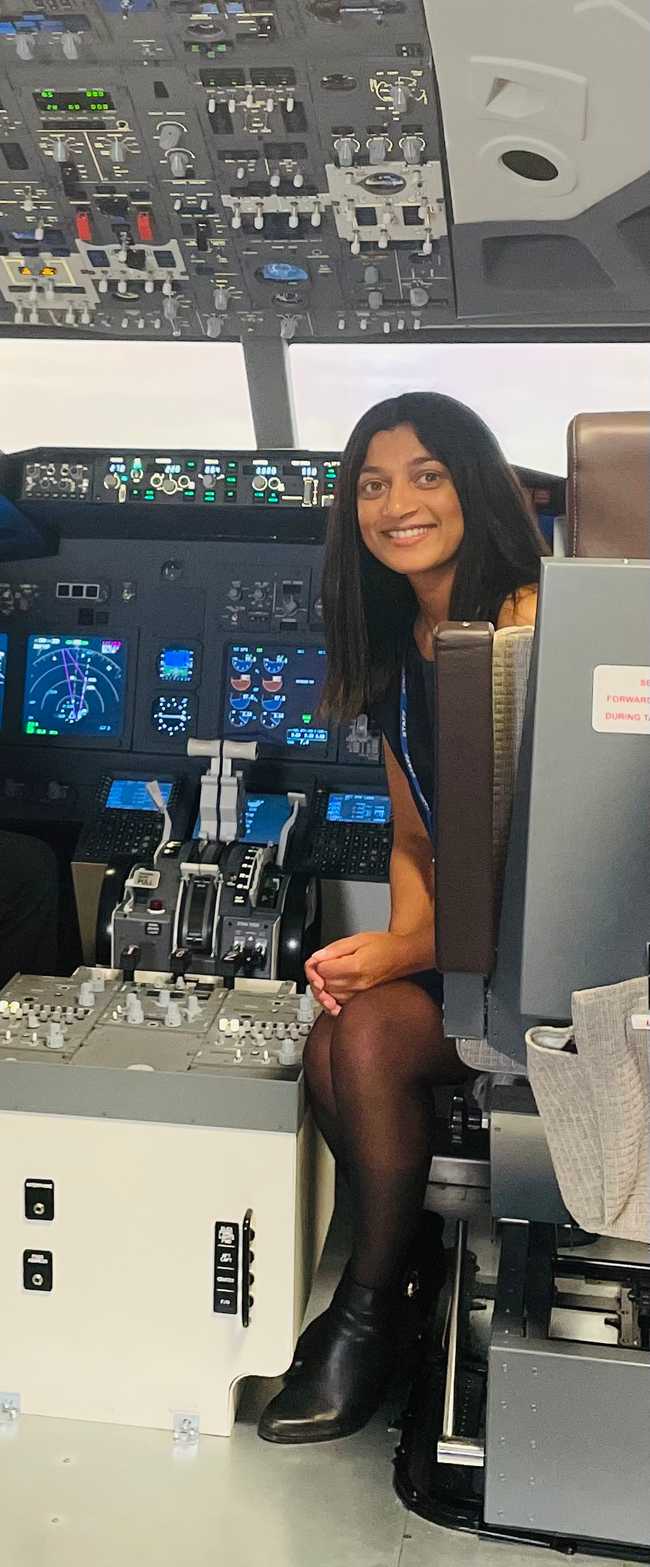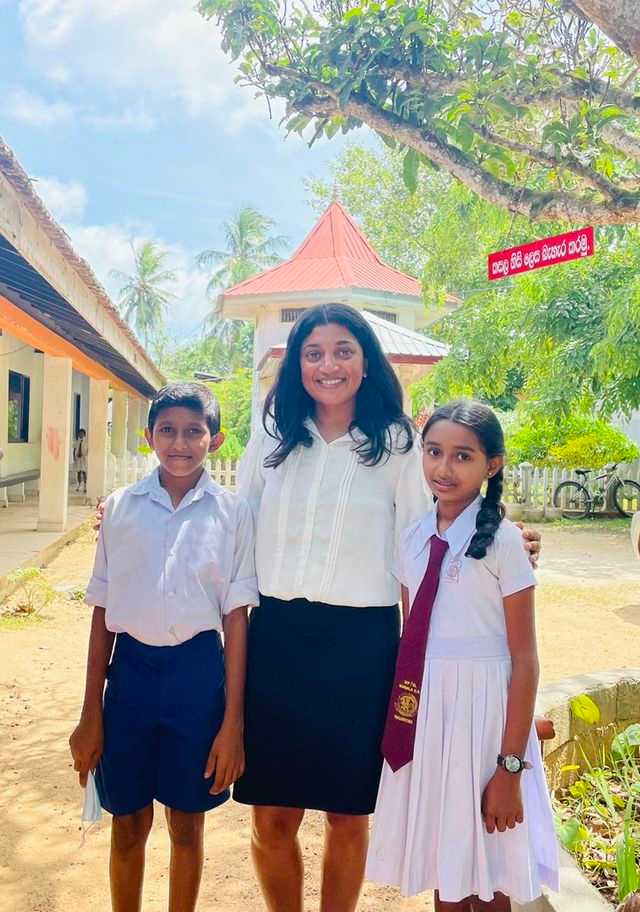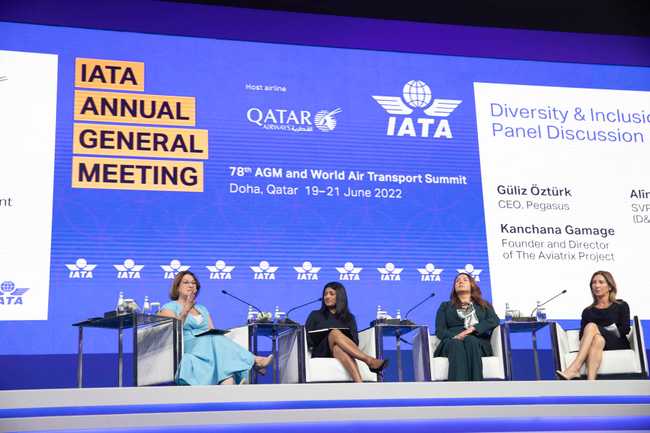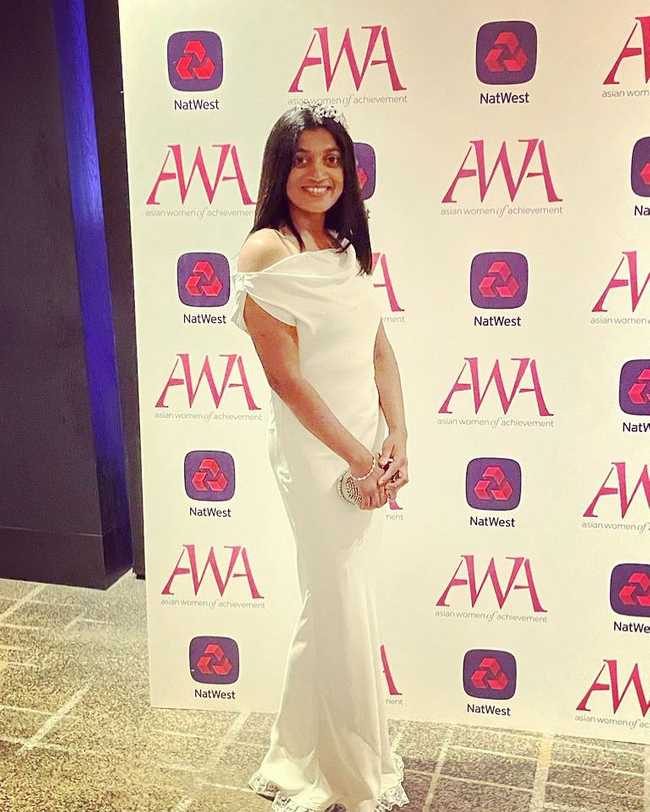Kanchana Gamage Pilot and Founder of Aviatrix Project
Kanchana Gamage ~ Pilot, Lecturer and Founder of 'Aviatrix Project'
Why is Kanchana Gamage an Inspirational women and DEI Champion?
Having started her career in education, Kanchana leads initiatives to encourage women and girls and those from disadvantaged backgrounds to consider a career in aviation and aerospace. She is passionate about teaching across Aviation degrees and supporting students who have chosen the Pilot Programmes. She previously worked for the Civil Aviation Authority supporting the Skills Outreach Programmes in conjunction with the Department for Transport.
Having been a Headteacher and a Lecturer in Education she combined her experience and passion for aviation as a Private Pilot to launch The Aviatrix Project in 2015. She believes that role models are key to changing the landscape. The Aviatrix project offers sustainable, long-term outreach to ensure that there is a pipeline of diverse talent into the industry. As part of the project Kanchana works closely with primary and secondary schools in the UK as well as higher education institutions to encourage STEM education. The project also offers flights, bursaries and a mentoring program for aspiring pilots as well as support for parents.
Kanchana's research interests are in the intersectionality of race and gender in education and she is currently an Aviation Ambassador for the Department for Transport.
What inspired you to become a pilot?
Growing up in Sri Lanka near the approach to Colombo airport, I dreamt of flying the vast oceans. Already at the age of 5, I knew I wanted to become a pilot one day and I held this ambition even when I moved to the UK in my teenage years. Lack of knowledge about opportunities and certainly lack of finances meant that this dream never materialised. After much thought I pursued a career in education and became a headteacher and a lecturer.
What inequalities do you see in your work?
The biggest challenge was the lack of role models at a young age. This set the course for my career and not having the opportunities and financial backing meant that I was not able to pursue a STEM career at a young age as I had hoped. This is what made me absolutely determined to become a pilot as I got older and set up an organisation which supported young people who are from disadvantaged backgrounds.
Tell us about the 'Aviatrix project' and the passion that fired you to set it up
My passion for aviation remained throughout my life and in my early 30s I gained my private pilots licence. Having been frustrated by the lack of cohesive STEM education programmes and the clear lack of diversity in the industry I created The Aviatrix Project CIC in 2015. I realised I had something unique to offer by combining my two passions - and two areas of expertise - and could now help to bridge the gap between aviation and education. The main aims of the project are to inspire more women and girls to consider aviation and aerospace careers and to support anyone from a disadvantaged background to experience flying.
Our volunteers regularly visit schools, colleges, aviation events and offer assemblies and workshops as well as mentoring and flight opportunities. They aim to inspire young people to aspire to do something they never thought possible. They represent all areas within the industry from pilots, engineers, air traffic controllers, ground crew etc. They all represent different flying disciplines from rotary, fixed wing, ballooning, gliders and drones to name a few. And all have a story to tell. It’s not financially viable for everyone to enter the flight deck - but it is possible with the right solutions and pathways - and the right support. We support young people and families with mentoring and signposting them to where they can get up to date information and support. It is also one of our main aims to target young people and schools from disadvantaged areas across the UK. This isn’t just about flying, we open up the whole industry for them and help them understand the exciting world of STEM.
How can we create change and see more DEI in the world?
Role models have been instrumental in my career. It’s about young people seeing someone that they can actually see themselves becoming. It’s very hard for them to imagine what it’s like to be someone else if they don’t see it in action. This is also why it’s so important to have real diversity, as even now, there are perceptions around what scientists, pilots and engineers look like. Ultimately there are no limits, no barriers, only the ones we have created. I feel a great sense of responsibility as an ambassador from an ethnic minority community to ensure I’m a strong role model.
But role models can’t work in isolation. Nor can it be a tokenistic gesture. It can’t be one assembly, one workshop or one stem outreach event. It needs to be targeted and sustained. What I’ve learnt from my career spanning 15 years in education is that children form perceptions at an early age. Around 6-7 years they form perceptions about careers and gender stereotypes. Of course career aspirations change but those early ideas will stay. If you have stem aspirations at 8, 10 you’re likely to have them at 14,18, into university and beyond.
We’re at a crossroads and I can see things changing from what they’ve been, but it takes passionate people with the right mindset to do this. I consider it a privilege to be involved in changing those mindsets. So the more we add to that bag of science capital now the more likely we will see young people from diverse backgrounds enter the industry in the near future. If we know that gender imbalance takes hold at such an early age it’s important to know that outreach in universities and colleges – even secondary – isn’t the best answer. We need to start much, much younger.
That’s why I'm so passionate about the work we do. We do a huge amount of work in the primary age range – in primary schools, early years settings and also community groups. I see it as cultivating and nurturing future talent and know that we will reap the rewards in 10-15 years. I know we will see young people we’ve worked with on the flight deck and as engineers and in STEM careers. I’ve seen over the past few years that there are so many outreach programmes. It’s important we work together to make sure that all the programmes are high quality and sustained over time. For this to happen collaboration is key. This is how we create a pipeline of future talent into the industry. This is how we inspire the next generation.
Why do you think there is a shortage of female Sri Lankan women on public platforms?
It’s never easy to break glass ceilings - and even more so against the backdrop of social and cultural challenges.
Given the great diversity among Asian women, it’s impossible to do justice to the vast range of experiences. Gender and race intersect to create a particularly interesting - and challenging - dynamic. Addressing the multiple factors, stereotypes and gender norms in Asian societies and diasporas that shape our aspirations is all our responsibility. I do believe that Sri Lankan women can foster self limiting beliefs and not put them forwards for promotions and celebrations in the public sphere. Family and cultural norms are much the issue here.
What advice would you give to youngsters who want to follow in your footsteps?
It’s important to keep the passion which attracted you to the industry. It’s important to be the absolute best you can be in your role and be authentic – and to use your voice to champion what you believe in. Persevere through the challenging times and seek support - there is so much willingness to help others within the industry and this has become even more prominent since the pandemic. Attend diversity and inclusion events, join organisations who champion the cause and connect with companies and individuals who nurture this. And it’s important that as you excel in your career that you support young people who are entering the industry by becoming a role model for the younger generation.
How do you want to use your voice to create change?
I'm so passionate about the work we do. We do a huge amount of work in the primary age range – in primary schools, early years settings and also community groups. I see it as cultivating and nurturing future talent and know that we will reap the rewards in 10-15 years. I know we will see young people we’ve worked with on the flight deck and as engineers and in STEM careers.
I’ve seen over the past few years that there are so many outreach programmes. It’s important we work together to make sure that all the programmes are high quality and sustained over time. For this to happen collaboration is key. This is how we create a pipeline of future talent into the industry. This is how we inspire the next generation.
We’ve been having conversations about the STEM skills gap for years, particularly in relation to the under representation of women in the industry. Reaching gender parity in the sector is not only a diversity and inclusion issue – it’s a business issue. It’s been proven time and again that companies who have a diverse workforce are more productive and profitable.
We need to ensure that all organisations and businesses adopt diversity and inclusion policies as a priority. It’s vital that this is given the importance it deserves within workplaces – and not just through a working party as a tick box exercise or a tokenistic gesture. Both employers and employees need to understand the importance of diversity and inclusion. And it’s not just an issue about women – it’s about everyone supporting and championing all underrepresented groups in society. We must not ignore the fact that aviation can be a costly choice of career for those wanting to enter the flight deck - support for flying training such loans and funded schemes from employers need to be considered if we are to reach a level playing field for entry. Anything else will undoubtedly leave out passionate, talented individuals who simply can't afford to train.
There are certainly barriers for success for women and it is possible that this is due to a lack of confidence. Companies not only need to attract women but also retain them. Competitive and fair salaries and access to development opportunities will attract more women – and keep them there. Diversity initiatives that include policies for women are proven to be hugely beneficial such as fair maternity policies and flexible working for parents and carers. Companies can also devise flexible recruiting strategies which take into account women’s specific needs and aspirations. This can include aspects such as using gender neutral language in job descriptions.
It’s important that companies work with university engagement teams to inspire, mentor and champion women who want to enter the industry. Students need to meet role models, take part in activities which showcase careers and foster technical literacy. This work also needs to extend to schools where girls from a young age see aviation and aerospace careers as something to aspire to. Apprenticeships and graduate schemes are also a way in which the talent pool can be widened.
Earhart once said, “Some of us have great runways already built for us. If you have one, take off! But if you don’t have one, realize it is your responsibility to grab a shovel and build one for yourself and for those who will follow after you.”
For me it has always been about helping others and never just about what I could achieve.
Which female Sri Lankan inspires you?
The woman who gave me wings long before I got my wings – my 103 year old grandmother!
I spend much of my personal and professional life working on how I can make a difference to equality. She is my inspiration and raised me to be independent, determined and to live a life with purpose. It’s her strength that’s allowed me to navigate the turbulence I’ve faced in life - and I can thank her for all I have accomplished. The greatest fortune of my life to have been raised by such a strong woman.
Recent Posts
- Irstel Jansen, Passionate Social Entrepreneur April 2024
- HERA Project X Making an ImpactFebruary 2024
- Ashley Davis, Uncharted HostFebruary 2024
- Goddess Energy by Karen LaneNovember 2023
- Tooting Mama's Devilled Prawns RecipeOctober 2023
- Tooting Mama London Food BloggerOctober 2023
- Melisa Fernando Wildlife Photographer September 2023
- Sara Alke Jewellery Designer September 2023
- Define The DIVINESeptember 2023
- Your Voice Can Change Your LifeAugust 2023
- Self Love Self BeliefJuly 2023
- Mindset Your StoryJuly 2023
- Movement is IgnitionJuly 2023
- Aadhitya Jayaseelan Artist Founder of KayamaiJuly 2023
- Clara Kraft 'Bawa's Garden'July 2023
- Kanchana Gamage Pilot and Founder of Aviatrix ProjectJune 2023
- Indy Vidyalankara Music PR ConsultantJune 2023
- Yoga Poses to unleash your VoiceJune 2023
- Why Garden Office Spaces WorkJune 2023
- Recognise Your Imprint Voices, Find YoursJune 2023
- Inner Voice & Self Belief, change the loopJune 2023
- A Curious Foodie in Sri LankaJune 2023
- Your Voice A Healing InstrumentJune 2023
- Rachel Chanmugum, Sound HealerJune 2023
- Find Your Voice in a noisy worldJune 2023
- Finding your truth and pleasure states through voice June 2023
- Dee Gibson Founder of Kalukanda HouseJune 2023
- Holly Clark, CoachJune 2023
- Karen Lane, Yoga TeacherJune 2023
- Elizabeth Healey, NeuroscientistJune 2023
- Kind Traveller, Positive Impact TourismOctober 2022
- Every Stay Gives BackOctober 2022
- Sala Salwatura, Yoga TeacherOctober 2022
- Piyumi's StoryFebruary 2022
- Honeymoon Escape after CovidDecember 2021
- Sam Clark, A Passion for TravelFebruary 2021
- Kalukanda House : Emotional Design, definedSeptember 2020
- SeaSisters Empowering Women through surfingSeptember 2020
- Our Charity Partner - TFTJune 2020
- Marie Claire at Kalukanda HouseJune 2020
- Kalukanda House Sound Healing Meditation May 2020
- An Audience with Ashok FerryMay 2020
- A very special Yoga RetreatMarch 2019
- Guest Blog by Dan Sefton, Writer (Good Karma Hospital)January 2019
- Kalukanda House Aubergine CurryJune 2018
- Building Kalukanda House the StoryJune 2018



